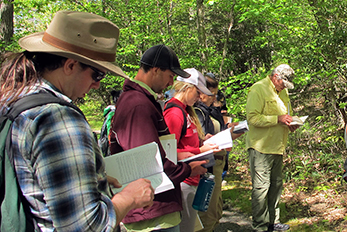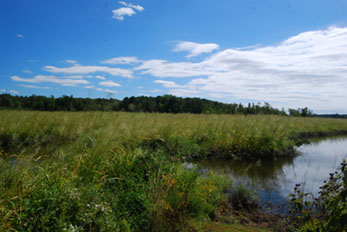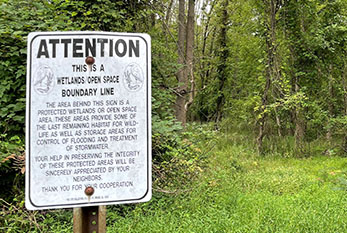Main Content
Gain winter plant identification skills in this two-day course that includes hands-on vegetation identification training for wetland delineation.
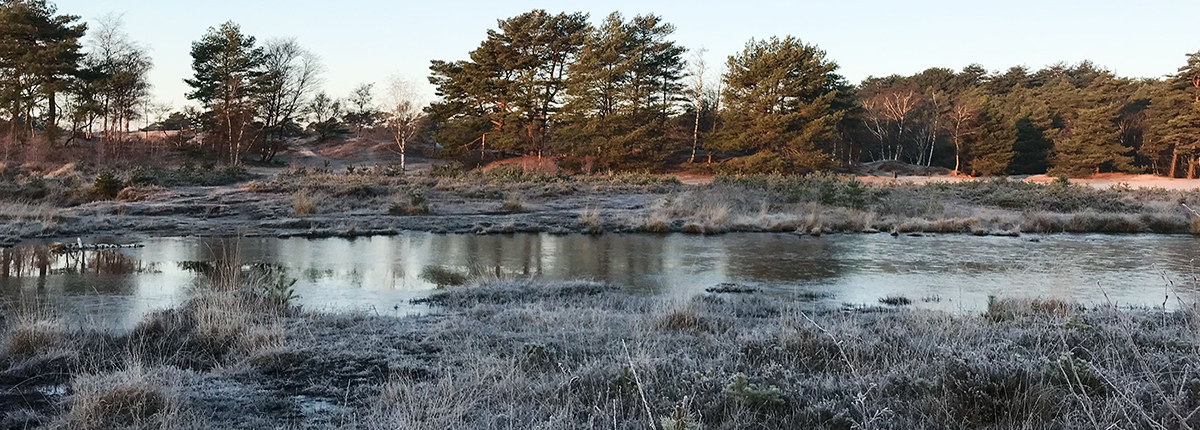
Course Status Notice – Not Scheduled
We do not have an offering of this course scheduled at this time. Please join our email list to be notified when the next offering is scheduled!
Jump to: Overview | Instructor | Reviews | CE Credits | Contact Us | Related Courses | Join Email List
Course Details
Course Name: Identification of Wetland Plants in Winter
Course Code: EH0205CA26
Date of Most Recent Offering: January 21 & 22, 2026
Course Overview
Wetland plants, also known as hydrophytes or hydrophytic vegetation, have adaptations that enable them to grow and reproduce with their roots in water or saturated soil for at least part of the year. In contrast, plants that cannot survive in saturated conditions are commonly referred to as upland plants.
Along with hydric soils and hydrology, the presence of wetland plants is one of the primary factors involved in the identification of wetland areas and the delineation of wetland boundaries. Therefore, the ability to identify wetland plants and and distinguish between upland and wetland plant species is an essential step in the wetland delineation process.
This 2-day course gives you the opportunity to increase your wetland expertise by learning to identify vegetation during the winter months! Through a combination of classroom and field training, nationally recognized wetland expert Ralph Tiner will give you the tools to gain a competitive edge in the field of wetland delineation all year long.
By examining criteria such as bark, twigs, and other leafless characteristics, you’ll learn how to positively identify wetland plants even when winter conditions eliminate leaves as a distinguishing feature.
Day 1: January 21, 2026; 8 am – 4:30 pm at Somerset County Environmental Education Center, Basking Ridge, NJ
Day 2: January 22, 2026; 8 am – 4:30 pm at Bioresource Engineering Laboratory (formerly ECC), New Brunswick, NJ
Please dress accordingly for the outdoors!
NOTE: This course is NOT part of the Wetland Delineation Certificate Series. If you wish to earn the certificate, you must take Vegetation Identification North or South.
Featured Topics
Featured Plant Communities Covered in this Winter Vegetation Identification Course:
- Freshwater Marsh
- Scrub Shrub Swamp
- Red Maple Swamp
- Floodplain Forest
- Upland Meadow
- Wet Meadow
Who Should Attend?
This wetland vegetation identification course is designed for anyone who wants to gain experience identifying wetland plants during the winter months. Past participants have included:
- Ecologists and Biologists
- Engineers
- Environmental Scientists, Environmental Consultants, and Environmental Planners
- Forestry Specialists
- GIS Analysts
- Horticulturists and Arborists
- Landscape Architects, Landscape Designers, and Landscape Contractors
- Land Surveyors
- Natural Resources Specialists
- Naturalists and Conservationists
- Soil Scientists
- Wetlands Specialists and Wetland Scientists
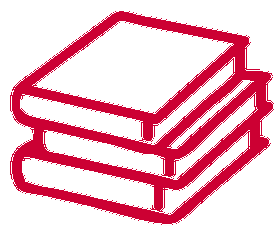 Required Textbooks
Required Textbooks
There is one (1) required textbook for this course:
- Winter Woodies: A Guide to Trees, Shrubs, Vines, and Trailing Plants for the Northeastern United States (2024) – R.W. Tiner – $38.00
- This textbook is only available through our office. Please make your selection with your registration at checkout.
Meet Your Instructor
Ralph Tiner, M.S., M.P.A., SWS Fellow

Ralph Tiner has more than 40 years of practical experience in wetland delineation and is a nationally recognized authority in the field. He recently retired from the U.S. Fish & Wildlife Service where he directed wetland mapping in the Northeast United States as part of the U.S. Fish & Wildlife Service’s National Wetlands Inventory (NWI). He is a nationally recognized expert on wetland delineation and has been actively involved in improving wetland delineation techniques for decades. In addition, he was compiler and principal author of the Federal Interagency Wetland Delineation Manual, which was published in 1989 and is the standard for identifying and delineating wetlands in New Jersey.
Read More About Ralph Tiner
Ralph has written extensively on the subject of wetlands and is the author of several field guides including: Field Guide to Non-tidal Wetland Identification, Maine Wetlands and Their Boundaries, A Field Guide to Coastal Wetland Plants of the Northeastern United States, and In Search of Swampland, as well as an update of the Wetland Indicators book entitled Wetland Indicators: A Guide to Wetland Formation, Identification, Delineation, Classification, and Mapping. His most recent books are: Tidal Wetlands Primer: An Introduction to Their Ecology, Natural History, Status, and Conservation and Remote Sensing of Wetlands: Applications and Advances (for which he is senior editor and authored several chapters).
In addition to writing about wetlands, he has been teaching wetland identification and delineation courses through the Rutgers Office of Continuing Professional Education Office since the mid-1980s.
Student Reviews
“Good introduction to winter botany, covers terms and ID needed to get started. [Now I will] rely more on keys, different sources to help narrow down ID.”
– Robert Bird, Environmental Specialist
“I learned that tree canopy shape and size differs based upon the leaf type (simple or compound). This can be a helpful additional indicator in the winter when studying the branches of trees in the field to determine the species.”
– Past Participant
“This is one of the most useful wetland vegetation classes I have taken. Ralph is very knowledgeable and is an excellent instructor.”
– Past Participant
Continuing Education Credits
The most recent offering of Identification of Wetland Plants in Winter was approved for 1.6 Rutgers CEUs (16 contact hours), as well as the following credits from professional organizations. We will reapply for similar credits the next time the course runs, but we cannot guarantee credit approval for future offerings.
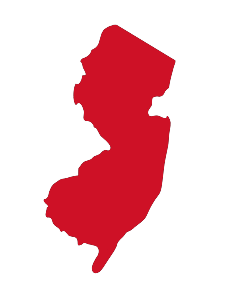 New Jersey
New Jersey
NJ Certified Public Works Managers (CPWM): 5 Technical and 5 Management Contact Hours
NJ Health Officers and Registered Environmental Health Specialists (HO/REHS): Rutgers University, NJAES, Office of Continuing Professional Education has been approved by the New Jersey Department of Health as a provider of NJ Public Health Continuing Education Contact Hours (CEs). Participants who complete this education program will be awarded 15 NJ Public Health Continuing Education Contact Hours (CEs).
NJ Professional Engineers: 12 Continuing Professional Competency (CPC) Credits
 New York
New York
NY Landscape Architects: 14 hours EA
NY Professional Engineers/Land Surveyors: 12 PDHs or 12 hours
Program Questions? We’re Here to Help!
If you have any questions about Identification of Wetland Plants in Winter, please don’t hesitate to reach out to us.

Senior Program Coordinator: Suzanne Hills
848-932-7234
suzanne.hills@rutgers.edu
For registration assistance, please contact our Registration Department at 848-932-9271, option 2 or email registration@njaes.rutgers.edu.
